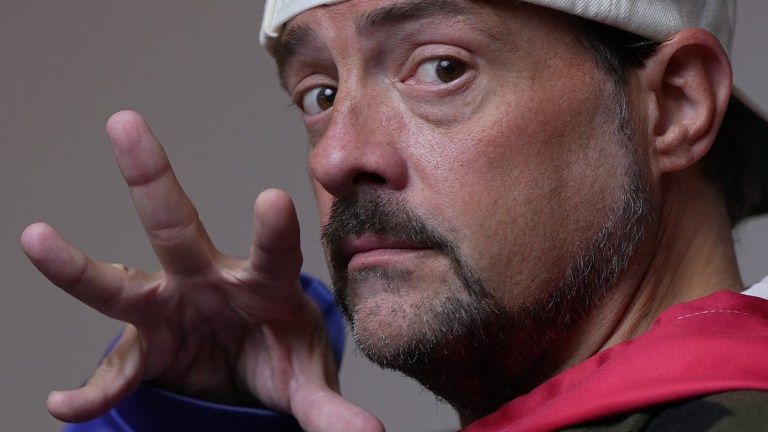Why Kevin Smith Wouldn’t Make Clerks Today
Kevin Smith doesn’t think a movie like Clerks could have the same generational impact in the 21st century that it did in 1994, nor would he think to make it if he were starting out now.

Among the many Cinderella stories that came out of the indie filmmaking scene of the 1990s, none was more unlikely or foulmouthed than Clerks. Written and directed by Kevin Smith in his spare time while working a dead end day job at a New Jersey convenience store, this grainy, black and white, and 16mm film exists purely because a storyteller with a few months of film school under his belt (and a willingness to max out credit cards to the tune of $28,000) wrote what he knew.
Smith’s Clerks became the most unlikely of generational touchstones: a passion project that spoke to a specific moment of Gen-X apathy as well as the timeless ennui that comes with being in your 20s and not knowing what to do with your life. This minuscule, outside-the-mainstream indie broke out at the Sundance Film Festival, and the rest is ‘90s alt-culture history. This was the beginning of Smith’s View Askewinverse and a string of decade defining comedies—as well as an unlikely trilogy with Clerks spawning both Clerks II (2006) and now, finally, this fall’s upcoming Clerks III.
It was while promoting the latter that Smith showed up at Den of Geek’s studio during San Diego Comic-Con. Ever the cheeky showman, Smith was dressed as his popular alter-ego “Silent Bob” and appeared to be in genuinely good spirits while talking about how Clerks III became a love letter to the characters who gave him so much in his life. We’ll have more of that conversation closer to the movie’s release, including why it was so important for Smith to finally let the characters from his 1994 movie become filmmakers themselves.
Yet while talking with us about the prospect of actually trying to make a Clerks-like movie in 2022, Smith is surprisingly candid about why he doesn’t think such a film could break out the way his first picture did in ‘94—or, indeed, if he’d ever imagine making such a picture if he were a younger man today.
“I don’t think so,” Smith says when asked about duplicating Clerks’ zeitgeist appeal now. “I think now in the age of TikTok, it’s much easier to get the idea across that ‘this job sucks!’ with a 30-second video.”
Noting how his wife recently showed him a bitingly funny TikTok channel where an online personality’s whole schtick is about how frustrating it is to deal with IKEA furniture, Smith concedes that if he were still a disaffected twentysomething, he would want to be making similar online content.
“It would never occur to me to make a whole fucking narrative,” Smith says. “Like 90 minutes in a convenience store when you could just do a series of fucking bitching at the camera videos that are devastatingly funny? So yeah, I think if TikTok existed, if Instagram existed, if the internet existed right before I made Clerks, I don’t think I would’ve tried to make Clerks, because I would not have felt talented. When you turn on the internet, yeah it’s a hate machine, and yeah it’s divisive, and there’s a lot of shit that comes along with it, but it is a window into how many creative and inventive and talented people are out there, man. In big and small ways.”
Smith also concedes the movie industry as it was in 1994—or even as it was in 2006 when he made Clerks II—has changed to such a degree that distributors, and thereby audiences, taking a chance on a rough black and white first-time film is almost impossible to fathom.
Says Smith, “If I did the mental math, and I was trying to make Clerks today, I’d look at the odds against me. Number one, movie distribution doesn’t exist in the same way it has predominantly existed throughout most of my life. Since I’m not making a Marvel movie or a fucking Tom Cruise movie, I don’t know if I’d get a berth in the cinemas any place. And I’m certainly not going to get picked up by Netflix because they pump money into filmmakers from all around the world to make high end looking products. They’re not necessarily in the acquisition business. So for a small guerrilla-made film, at that point my options would be incredibly limited.”
Smith even suggests young hungry filmmakers like his early ‘90s self might look to create things in the NFT market, which he also has dabbled in with the release of Killroy Was Here earlier this year. At least in that world, Smith argues, you would know there’s a passionate and dedicated marketplace for outside-the-box art.
In the end though, he imagines social media would just dissuade him.
“I’d be so intimidated by how much funnier, how much smarter, how much more talented people are that I’d probably just put the idea aside,” says Smith. “So thank God those voices didn’t exist when I was getting started.”
He might think there are funnier talents out there, but for multiple generations of audiences, there are few more distinct voices in comedy than Smith. And they’ll get to hear his askew point-of-view again when Clerks III opens on Sept. 13.
